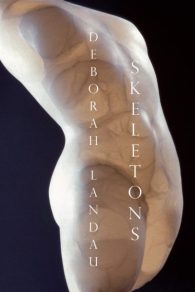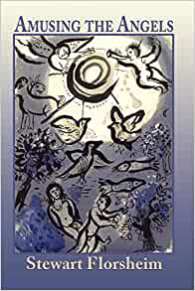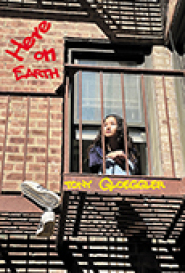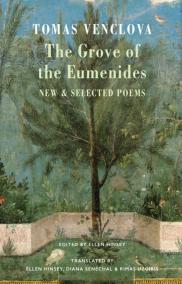
Deborah Landau, Skeletons,
Copper Canyon Press, 2023.
ISBN: 978-1-55659-665-0. 88 pages. $18.00
Deborah Landau’s great theme has
always been the body, the living, breathing, conscious, thinking, center-of-pleasure-and-pain bag of bones we all inhabit, and in her case, a female body with all its feminine sensuality and
reproductive functions. Her last two collections, The Uses of
the Body and Soft Targets,
focus on our fragile corporeal beings with existential angst and sensual exuberance. Soft Targets, moreover, considers the fragility of the earth that we inhabit, the political
dimension, where our vulnerable bodies exist. (Just so, she laments the “ecocide” we are committing, in one of the new Skeletons poems.)
Just as Soft Targets was written against the backdrop
of terrorist attacks, so Skeletons is written under the looming shadow of the pandemic lockdowns. Instead of “souls” clothed in flesh, Landau identifies the core of being as skeleton, which
is a more immediate, structural image than a floaty insubstantial spirit. “Sorry not sorry, said death. He wasn’t fucking around,” she writes in a “Skeleton” poem.
Skeletons is constructed of alternating sections of “Skeletons” and “Flesh.” Each “Skeleton” section is composed of
four short poems, all beginning with the sibilant s of “skeleton” (So, Sundays, Strutting, Sorry, Surprises, Silence, Spooky, Savasana, S’mores and Studmuffin among them), the “Flesh” sections
usually a single poem exalting desire and its slaking. (“It must give pleasure but rarely it rarely does. / But pleasure is so useful when it comes.”). The collection ends on a section titled
“Ecstasies.” “Birth and love and death, three songs,” as she writes. “Are we done with life? I am still so into it,” Landau elaborates, “the song of a siren / has a sort of infinity in it.”
She’s alluding to ambulances, fire trucks, cop cars whizzing by in emergency mode, but no less the seductive allure of the mythological women who tempt Odysseus.
To put it in great, mythic,
existential terms, in all her work but especially here in Skeletons, Landau confronts the clash between Eros and Thanatos, the life principle and destruction. (Does anybody get out of
this alive? Or, as she writes in a “Skeleton” poem, “Any way outta this bag of bones?”) Yet Landau writes with lyrical precision and take-no-prisoners wit that brings its own pleasure to the reader.
One L.A. Times reviewer aptly called her a cross between Dorothy Parker and Sylvia Plath – sparkling wit and suicidal depression. (“Sundays I spend feeling sorry for myself,” she starts one
of the “Skeleton” poems. “I’ve got a / knack for it I’m morbid.”)
“We liked birth, it kept the death away– / each time one kid grew we’d hatch another,” she
writes in a “Skeleton” poem, reflecting on married life, the pregnancies, and in another, as she confronts middle age and implicitly the consequences of menopause, “ it seems we’re creeping into the
midnight of our fleeting / lives.” But in another droll “Skeleton” poem, this one revolving around savasana, the flat-on-your-back yoga position (corpse pose – “you sucked at it, couldn’t corpse”),
she asks herself, “Temperamentally unfit for death, are you?” Carpe diem is often an impulse she expresses throughout (“nab this life while you can mad fleet s’il vous plait,” she writes in
a “Skeleton” poem set in Paris), and in the poem that follows:
Skeleton, some wonder if you are practical
keening as you do through this city
ensconced in flesh, a tailored suit for bones
lost plush in skin. Is it a good life within
exiled in the singular anatomical body?
(Thanatophobia, mine.) OK, breathe. There’s
oodles of oxygen for now—let’s live a little, we’re here!
Natter on, nitwit. I’ve had about enough of you.
Had
enough? Well, noting her
“dopamine addiction,” in another “Skeleton” poem, Landau equivocates. She has a “tendency to / toggle between gloomy and elate.” In another she acknowledges feeling a “kinesthetic dopamine abundance
as though (is this joy?) / eviscerating the void.”
Indeed, the final “Flesh” poem begins
ruefully:
It wouldn’t be so bad if it didn’t all go on without you.
These inhabited days, the no-see-ums of the fifth arrondissement
that bit us all summer, the hard fact of time hauling us forward lit.
This is the nth year of my life and so far it’s not the last
and so far it’s not the sweetest but it is because life is sweet.
It’s the way time works, going relentlessly forward, “into the not young we go awhile before ghosting the old,” ever forward into “the future that narrows / all of us into a shovel of dirt.”
But… but…but…but… Deborah Landau’s subtle, mordant wit is all over these poems, so no matter how bleak the words sometimes seem, she’s always winking her eye at the reader. As she writes in the “Ecstasies”
Look, these bones are made for us
and the room is mild, and the catastrophe
though nearer still is not.
As Whitman wrote, Happiness, not in another place but this place…not for another hour, but this hour.
Charles Rammelkamp
To order this book click here
Charles Rammelkamp is Prose Editor for BrickHouse Books in Baltimore, where he lives, and edits The Potomac, an online literary journal. http://thepotomacjournal.com. His photographs, poetry and fiction have appeared in many literary journals. His latest book is a collection of poems called Mata Hari: Eye of the Day (Apprentice House, Loyola University), and another poetry collection, American Zeitgeist, is forthcoming from Apprentice House.
Stewart Florsheim, Amusing the Angels,
Blue Light Press, 2023.
ISBN: 978-1-4218-3528- 87pp. $20.00
Many of Stewart Florsheim’s poems, in his ruminative third collection, winner of the 2022 Blue Light Book Award, have the quality of a Zen koan or a line of scripture, their seeming simplicity holding a complex, multitudinous world. In “In Other Words,” he writes:
In ‘The Zohar’, Rabbi Shim’on says:
“When a word issued, it seemed to be one;
but as it was engraved in its place,
seventy branches appeared in that word...”
I imagine those branches with faces –
my parents, grandparents, ancestors.
Poems unfold from a word or a moment, as Florsheim brings his sharp observing eye to love, art, family dramas, and the devastations of history. Many poems are haunted by the Holocaust (Florsheim is the son of a survivor), by dream, by all the ghosts who linger. Long-dead neighbors open their doors, ask after the narrator’s parents. “I tell them they’ve been dying for years, but they refuse to let go.” In “A Scent,” the narrator says, “dreams are my quicksand...Mother always alive and dead. / The heavens have never been this transparent.”
Florsheim expertly captures this transparency, as people pass through the thin tissue between past and present, self and other. The grip of the past, the way it lives inside the present, makes life resonant with voice, memories, dreams. “Grandmother and her sisters whisper around the kitchen table. / My parents warn me there are two kinds of German: Hor mal!” listen up! In “Source” Florsheim writes:
In a dream, I try to describe to Father
my trek through the Himalayas.
A movie screen appears and we step into it,
the air so thin we cannot speak.
I want to tell him he’s no longer alive
but it doesn’t seem to matter.
We’re climbing a mountain and he’s walking ahead.
Every so often he turns to make sure I’m still there.
This same porousness appears in Florsheim’s keen renderings of intimate moments, which are often ambiguous, fraught: bodies merged but opaque, as when the prostitute thinks in “The Prostitute,” “...you will never know who I am,” or taut with tension, as that between two flamenco dancers and the singer:
The second dancer is quick, determined – the stage
a ribbon of red. She twists from one side of the floor
to the other, her stomping loud enough to drown out
his voice, but then he taunts her with mournful cries.
Her dance becomes quicker, staccato and then she
breaks into a deep arch and rises with a small smile:
the triumph of passion over indifference –
but not a victory for love.
In “Pierre Bonnard Walks into the Garden Naked,” (after the photograph, Pierre Bonnard Examining the Leaves on a Tree, by Marthe Bonnard, 1900-1901) sex is known by its traces, “the moist odor the lovers leave behind.” The lovers remain intimately connected yet separate as they shift between observer and observed.
Like the way he steps into his paintings at will –
to make love to Marthe as she lies, sprawled out on their bed,
or to straighten the sheets after the cats ravage them,
searching for the moist odor the lovers leave behind –
Bonnard walks into the garden naked and, seeing a tree
that attracts him, he gathers a few leaves in his hands.
Marthe captures the moment wondering, no doubt, what he’s
thinking....
Like many in the collection, this poem dances around the central tension of connection/separation. Even when lovers merge, there is a note of elusiveness, of somehow sliding past each other, out of the frame the poem has built. Boundaries are fluid and easily pierced. Florsheim’s narrator is reflective, questioning, especially in the many ekphrastic poems, as he slips into the scenes and inhabits the characters who captivate him. Here is “Golden Age” (after the painting, Woman Writing a Letter, by Gerard ter Borch, 1655):
The girl is writing a letter to her fiancé in the East Indies,
the tapestry on the half-naked table pulled back in haste.
She has a question about their engagement party –
the number of friends he plans to invite
to her parent’s canal house on the Singel –
because what she wants cannot be put into words.
She had a dream and woke up in a sweat
thinking about him – or was it his friend Paul?
....
Quiet moments mask complex dramas, in Florsheim’s poems as in the paintings. Familiar details refuse to be pinned to one meaning or moment.
In a number of crisp poems, with titles like “Origins,” “Betrayal,” “Hourglass,” the narrator leaps from one thought to another in quick succession, the lines restless and generative, as these in “Transits”:
A hot night for your chilling words to needle my skin.
Rachmaninoff on the car CD, and I’m in an empty ballroom, dancing.
I enter the old apartment building, climb the stairs, and walk down the dark corridor.
For the dying, time is endless....
I write one letter, then the next, and watch words disappear.
Many poems reach for spiritual connection, seemingly to anchor the self in such an ever-shifting world. Yet even faith is expansive, as in “Coming to Prayer”: “Finding faith is opening a window into the world”. These are mesmerizing poems that stay in the mind and refuse to let go.
Dorothy Wall
To order this book click here
Dorothy Wall is author of Identity Theory: Poems and the essay collection, Encounters with the Invisible: Unseen Illness, Controversy, and Chronic Fatigue Syndrome, and coauthor of Finding Your Writer’s Voice: A Guide to Creative Fiction. Her poetry has been nominated for Best of the Net, and her poems and essays have appeared in numerous magazines and anthologies. She has taught poetry and fiction writing at San Francisco State University and UC Berkeley Extension. www.dorothywall.com



